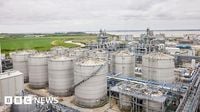The closure of Vivergo Fuels, the UK's largest bioethanol plant, has sent shockwaves through the Humber region and beyond, igniting fierce debate about the future of British industry, government priorities, and the true cost of international trade deals. After years of operating as a cornerstone of the region’s green economy, Vivergo’s wind-down—triggered by a combination of policy shifts and economic pressures—has left more than 160 employees facing redundancy and raised urgent questions about the nation’s energy and food security.
Vivergo Fuels, based in Saltend near Hull and owned by Associated British Foods (ABF), has long been a "key national strategic asset," capable of producing up to 420 million litres of bioethanol annually from wheat sourced from thousands of UK farms. Beyond its fuel output, the plant has also been the UK’s largest single site for animal feed production, converting residues from the distillation process into high-protein pellets for dairy cattle, according to BBC and Sky News.
But the writing was on the wall as early as May 2025, when Vivergo warned wheat suppliers that its future was in jeopardy unless the government intervened. The final blow came with the UK-US trade deal, which removed a 19% tariff on US ethanol imports up to a quota of 1.4 billion litres—roughly matching the entire UK market. Previously, the tariff had provided a buffer against what UK producers described as "unfair competition" from heavily subsidised American bioethanol. As reported by BBC, US imports are certified as a waste byproduct in the UK, giving them an additional financial advantage over British-made ethanol.
Vivergo’s managing director, Ben Hackett, did not mince words about the impact of the government’s decision not to provide a rescue package. He described it as a "massive blow to Hull and the Humber" and "a flagrant act of economic self-harm that will have far-reaching consequences." Hackett added, "We did not go down without a fight and I hope that the noise we generated over the past three months will make the government think twice before it decides to sign away whole industries as part of future trade negotiations."
The government, for its part, stood by its decision. In a statement reported by Sky News and BBC, officials said, "We recognise this is a difficult time for the workers and their families and we will work with trade unions, local partners and the companies to support them through this process." The Department for Transport and other government bodies argued that a bailout would not provide value for taxpayers or address the sector’s long-term challenges, pointing instead to the broader benefits of the trade deal, which they say protected "hundreds of thousands of jobs in sectors like auto and aerospace."
Still, the local impact is undeniable. Redundancies began on August 19, 2025, with about 60 staff—over a third of the workforce—receiving redundancy letters that day. The remainder will leave in phases, with the site expected to be ready for demolition by the end of the year. Vivergo’s operations director Alex Snowden, who lives just ten minutes from the plant, called the closure "heartbreaking" and told the BBC, "What we're doing effectively now is emptying the last of our brewery as we're winding down the plant."
The ripple effects extend far beyond Vivergo's gates. Local wheat farmers, like Paul Temple, have lost a major buyer for their crops and a source of feed for their livestock. "As a result of trade negotiations—making a plant effectively uneconomic... this is really frustrating," Temple told the BBC. Haulage firms, hospitality businesses, and other suppliers are bracing for the economic fallout. Louise Halder, director of a local haulage company, warned of a "massive" impact: "People [will be] out of work. Obviously there's an impact then on the hospitality industry, because people aren't going out, because they can't afford to. It just has a rippling effect on everybody, every business."
Regional politicians have been outspoken in their criticism. Beverley and Holderness MP Graham Stuart called the closure "devastating news for everyone who works at Vivergo and in its supply chain." Emma Hardy, MP for Hull West and Haltemprice, said she had spoken to officials to ensure "swift and effective support will be made available to those who need it." Hull City Council leader Mike Ross was "appalled" but "not shocked" by the government’s refusal to act, stating, "[Vivergo] is a company producing clean fuel and providing decent, well-paid jobs in our region."
Trade unions also condemned the decision. Charlotte Brumpton-Childs, GMB National Officer, argued, "A clean energy industrial strategy means nothing if we cannot protect plants long enough to deliver clean energy jobs here in the UK." Unite general secretary Sharon Graham called the government’s move "short-sighted," while the NFU farming union described the closure as "terrible news" not just for workers, but for thousands whose livelihoods depend on the supply chain.
Vivergo’s closure is not an isolated event. The Ensus plant in Redcar, Teesside—the UK’s only other major bioethanol facility—faces its own uncertain future, awaiting a government decision on whether it will receive support to protect its CO2 production. As Andrew Symes, chief executive of OXCCU, which makes sustainable aviation fuel, told the BBC, the closure means the UK will become reliant on imports for both CO2 and ethanol, a situation he described as "risky."
For a brief moment in mid-2025, there was hope. As managing director Ben Hackett told BBC Radio 4, the company had made progress in talks with the government and signed a memorandum of understanding with a "very well-financed company" interested in investing up to £1 billion in partnership with Vivergo. "They’re really great news and reinforce the value that the UK bioethanol industry and Vivergo specifically can bring to the UK," he said at the time. But ultimately, those efforts were not enough to overcome the combined pressures of international competition and domestic policy decisions.
As the last of the tanks are emptied and the plant prepares for demolition, the debate over Vivergo’s fate continues to resonate. Was this a necessary sacrifice for the greater economic good, or a preventable loss of British green industry and rural livelihoods? For the workers, farmers, and communities affected, the answer is painfully clear.






